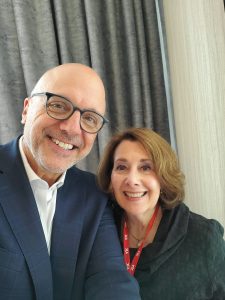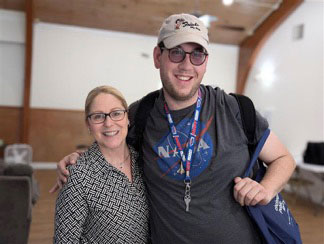
Submitted by AJC Cincinnati
In these critical times, what makes a leader? Rabbi Lord Jonathan Sacks wrote “all you need to do is…do deeds that heal some of the pain of this world and act so that others become a little better for having known you.” American Jewish Committee (AJC) recently provided a three-day intensive course to 33 participants as part of their Hilda Katz Blaustein Leadership Institute. As future AJC leaders, participants heard from experts about the agency’s long history confronting antisemitism and beyond. The seminar took place in White Plains, NY and was attended by Jan Armstrong Cobb, Vice President of AJC in Cincinnati.
One of the most significant things about the retreat was the chance to hear from and interact with AJC’s professional staff, including the new CEO, Ted Deutch. Armstrong Cobb commented, “Because our group was small and the nature of the training was to collaborate and learn from each other, we had the opportunity to sit and talk with these incredibly knowledgeable, involved, and perceptive individuals who have been in the center of policy making that affects Jews worldwide. The Abraham Accords, for instance, would not have happened without these people, and they were eating dinner at my table.”
The furor over judicial reform in Israel was at a crisis point during that weekend. Staff members in the room had recently held meetings in Israel with Prime Minister Netanyahu and other prominent government officials discussing this and other issues. In fact, AJC was the first American Jewish organization to express its position on Israeli judicial reform. This is just another real-time example of how AJC is in on-the-ground and at the center of world and Middle East developments.
A focus of the White Plains training was AJC’s Advocacy Core Training (ACT). The participants learned what sets AJC apart from other Jewish organizations, as the global, non-partisan, advocacy agency for the Jewish people. AJC’s global network spans six continents, allowing it to engage with leaders at the highest levels of government and civil society to counter antisemitism, open new doors to and for Israel, and advance principled democratic values.
ACT sessions included content on what participants need to know to support and advocate for Israel, and what to know to counter antisemitism. The difference between anti-Zionism and antisemitism was covered; participants also learned ways to engage with people who hold strong views about Jews and Israel that would be difficult to change.
Participants discussed how to collaborate more effectively with other organizations that operate in the same space. As a staff member said, just as we have room for more than one kind of car or toothpaste, so we have room for different organizations to promote the wellbeing of Jews in the U.S. and around the globe and counter antisemitism.
“ACT prepared us to know and own the AJC story, to be informed and know how to make the advocacy case, and how to be part of the lay-staff partnership that makes the organization so successful. And ACT did its part to prepare us as future leaders to carry out the teaching of Rabbi Lord Sacks,” Armstrong Cobb added.





